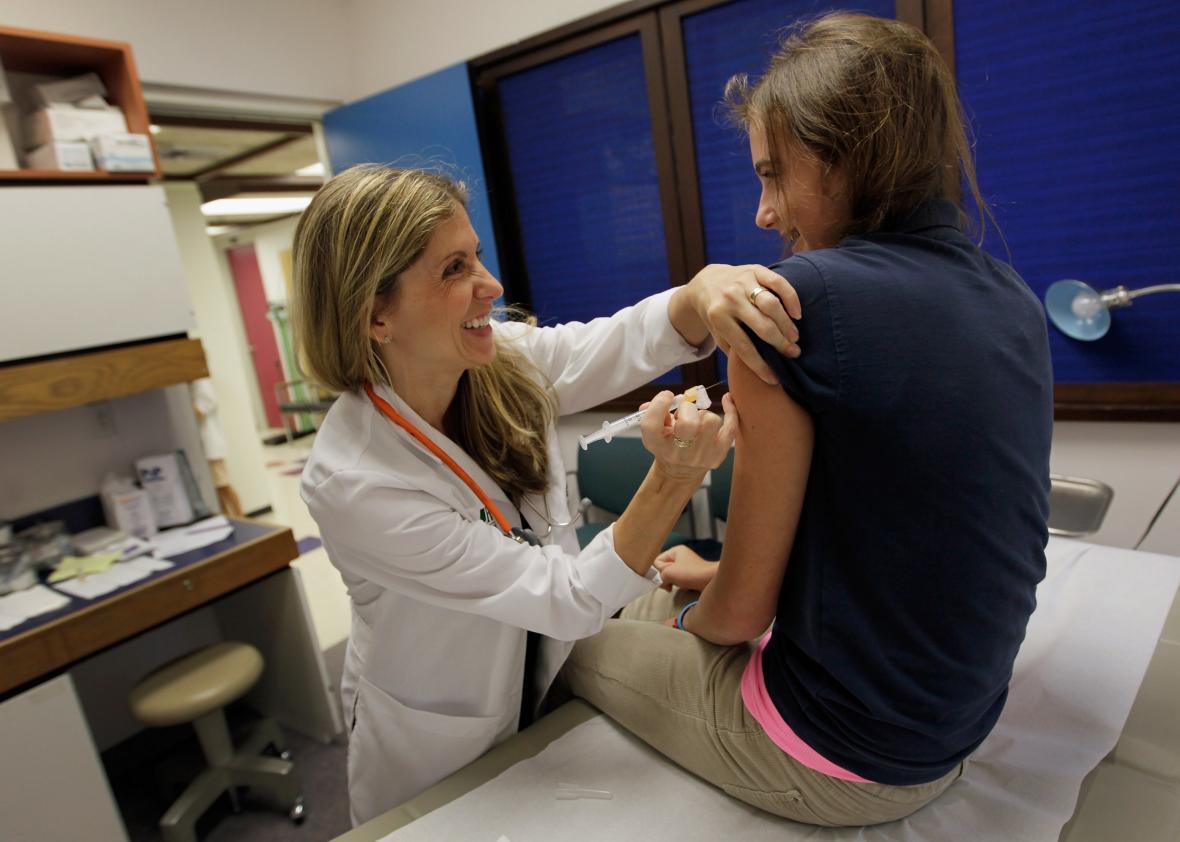The prevalence of human papillomavirus, or HPV, has fallen by two-thirds among teenage girls since a vaccine to prevent it went into use a decade ago, according to the New York Times. That’s the finding of a study published this month in the journal Pediatrics, and it’s especially good news considering that this sexually transmitted virus can cause cervical cancer, as well as cancer of the anus, penis, and the mouth and throat. As lead study author Lauri Markowitz of the Centers for Disease Control and Prevention told Scientific American: “HPV vaccination has the potential to prevent up to three out of four HPV-associated cancers.”
It feels tempting to declare a public health victory. But while we have the tools to combat HPV and related illnesses (which also can include genital warts), the incidence of HPV-associated cancers is actually on the rise. Of the 14 million new cases of HPV that occur every year, most clear up without incident; but experts estimate that 27,000 lead to cancer, usually occurring in adults older than age 40. Vaccination is of no use to that cohort, but unfortunately, we’re not doing enough to forestall the trend in younger generations. The HPV immunization rate remains dismally low: Roughly 40 percent of girls ages 13 to 17, and only 20 percent of boys, are vaccinated. That puts the U.S. far behind other countries, such as Australia, where the rate is 75 percent; the United Kingdom, where it surpasses 84 percent; and Rwanda, which has hit 93 percent among girls. The explanation for this delinquency is that, though Americans fear cancer, they fear teenage sexuality more.
The CDC recommends that all children receive the vaccine between the ages of 11 and 12. (The recommendation expanded to include boys in 2011; it extends up to age 26 for women and 21 for men, at which point, the thinking goes, the majority of people have been exposed to the virus). But when NPR sat in on one 11-year-old girl’s doctor’s appointment in Washington, D.C., in 2011, it recorded her mother’s less-than-enthusiastic response to the vaccine. “My daughter is so not sexually active that it seems very premature to even think about protecting her from cervical cancer,” she said. “I realize it’s probably more about my squeamishness with the thought of her becoming sexually active than the vaccination itself. … It’s not the science. I think it’s my own issues around her developing sexually.”
Unfortunately, many people share this D.C. mom’s gut reaction, but not her self-awareness. (D.C., Virginia, and Rhode Island are the only places in the U.S. that require the vaccine.) HPV prevention became a source of political demagoguery in the Republican primary of 2011, when Michele Bachmann went after Rick Perry for his efforts to set up a vaccination program in Texas. “[T]o have innocent little twelve-year-old girls be forced to have a government injection through an executive order is just flat out wrong,” she charged. Rick Santorum piled on, wondering whether Texas had “a very progressive way of communicating diseases” that made it necessary to “[have] little girls inoculated at the force and compulsion of the government.”
As the Times points out, medical professionals recommend the vaccine for 11- and 12-year-olds because their immune response is higher than that of teenagers, and because, in most states, they’re already headed to the doctor’s office for two other required vaccines (one for tetanus, diphtheria, and pertussis, and one for the meningococcal disease). Though research into how long the HPV vaccine lasts is ongoing, studies suggest it remains in effect for at least a decade; administering it at 11 means covering a span in which the vast majority of Americans become sexually active. The pearl clutching about teenage chastity has inspired multiple studies on whether being vaccinated makes teens more likely to become sexually active, or less likely to use protection—and, in every case, the answer was no.
But still, as the Times writes:
[M]any primary care providers either do not recommend the vaccine to parents and patients or do so halfheartedly. Some doctors are reluctant to discuss the vaccine because the conversation may dance uncomfortably around sexual activity. They may want to use their limited appointment time for health topics that parents may be more willing to engage.
Now, according to the Times, the medical community is pushing primary care doctors to “strongly recommend” the vaccine. The American Cancer Society is increasingly warning against HPV’s dangers for men as well as women, and a group of prestigious cancer centers released a statement in January that blared, “The HPV vaccine is CANCER PREVENTION.” But parents and lawmakers also need to start privileging that goal over desires to keep teens from experimenting in the bedroom. Unlike the rate of HPV-related cancers, the percentage of teens having sex is on its way down.
